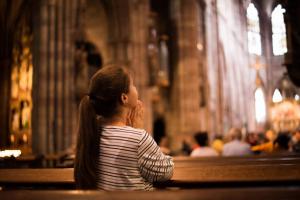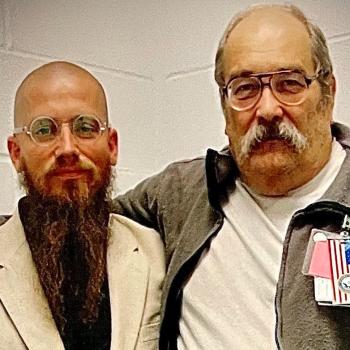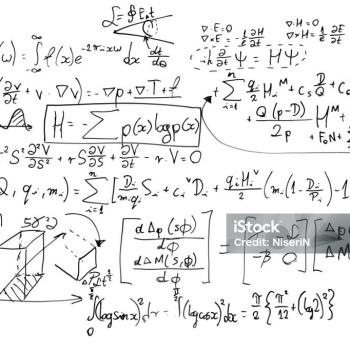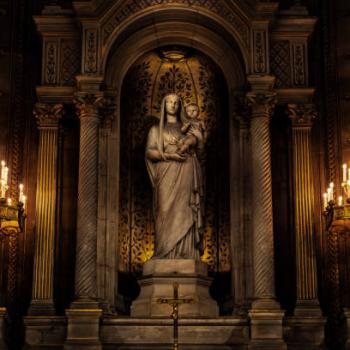
Recently, Bishop Robert Barron of Minnesota, whose Word on Fire ministry has made him one of the Catholic Church’s most prominent online voices, has been arguing in various venues that the “dumbing down” of Catholicism has stymied rather than enhanced the Church’s efforts at evangelization in the modern West. The dumbed down Catholicism on offer today in many Catholic parishes and even more Catholic schools and universities, as defined by Barron, emphasizes social justice as divorced from the rest of Catholicism’s rigorous intellectual tradition and theological understanding.
The Universal Church
Contra Barron, the contention of many on the “Catholic left” (a designation that, like “Catholic right,” underscores a fundamental misunderstanding of the faith among many of its self-professed faithful) is that the de facto defenestration, if not the de jure excision, of various Church doctrines and teachings is a price worth paying for a more welcoming and inclusive church.
As a lifelong Catholic who has often been frustrated myself by the mainstream Church’s culture of braindead clericalism, pervasive sexism, and myopic parochialism (racial, ethnic, and other), I understand as well as anyone why many of my fellow Catholics would readily sacrifice Aquinas and Augustine on the altar of openness to other “ways of knowing.”
But this impulse among many Catholics to express our supposed faith by parting with, well, Catholicism is ultimately self-defeating, even on its own terms.
The way to a more empirically inclusive Catholic Church is in fact through embracing the totality of our intellectual tradition, which is more than nuanced and dynamic enough to assimilate worthy additions and critiques. It is not wise to pick and choose only those pieces of our intellectual heritage that fit most easily into today’s iteration of a progressive political ideology. There are two main reasons why.
True Inclusivity
First, to set on one side of a ledger “intellectual rigor” and on the other “inclusivity” is to create a false and patronizing binary. To comprehend the fundamental teachings of the Church is to understand that faith and reason together constitute truth, and that any inquiry by any person—of whatever race, creed, sex, or color—that discerns truth deserves respect and attention. That this imperative has indeed far too often been disregarded in deference to the prejudices and power structures of a fallen world is an argument for fully engaging those teachings while striving in good faith for the specific open-mindedness that they mandate, not one for discarding them in obeisance to a trendy version of open-mindedness that is in fact anything but.
What Catholics willing to sacrifice intellectual rigor for greater supposed openness are really saying is that they wish to summarily include as truth so-called “ways of knowing” in which reason self-evidently does not abide—if said ways of knowing emerge from the mouths or pens of “the marginalized.” This constitutes sycophantic condescension to women and to racial, ethnic, and cultural others in what is really the self-deceptive pursuit of fashionable tolerance by mostly white elite progressives who merely happen to be Catholic, and who wish to reconstitute Catholicism in their own intellectually flimsy and emotionally solipsistic image.
After all, aren’t women and people of color perfectly capable of meeting the intellectual standard of reason as well as the spiritual standard of faith by which the Church discerns truth? I believe so. Do Catholics less attached to our intellectual tradition disagree? If so, I find that deeply unsettling and patently bigoted. More important, I find it unworthy of the universal Church, in which all superficial distinctions between people are understood to be the products of a lower world that the Church must transcend in pursuit of truth rather than replicate in pursuit of mainstream progressive accolades and self-congratulatory virtue-signaling.
True Evangelization
Second, to insist that a Church bereft of intellectual rigor has or will lead to a slowing of young people’s defection from Catholicism is to deny reality. As the mainstream Church has asked less and less of the faithful in the West, it has gotten exactly what it has bargained for: the kind of stupor that pervades any organization lacking clarity of purpose. Take a look at the nearly empty mainline Protestant churches, which long ago sacrificed their principles on the altar of elite progressive belonging, to see where that ends. It turns out that if I can’t get anything out of religious participation that I wouldn’t get out of a collegiate English seminar, there’s no point in attending church. (Indeed, it’s likely no coincidence that as the humanities themselves have similarly eliminated rigor in pursuit of a patronizing, racially essentialist, and anti-intellectual version of equity, they too are losing enrollments hand over fist. Why take Shakespeare, if I can already parrot a few catchphrases about his dead white maleness?)
Contrast the malaise of the Church in the West with its growth in the Southern hemisphere, where unadulterated old doctrines find both new adherents and new cultural valences by the thousands. It doesn’t seem to matter to a Church comprised almost entirely of people of color that many of the Church’s historical thought leaders (though not, it bears mentioning, the man who died on the cross to begin this whole enterprise) fit within a fundamentally unchristian social construction known as whiteness. Such a concern would, after all, be antithetical to the tenets of the faith.
Yes, it’s true that many of these new faithful, like most Catholics throughout history, are not reading foundational Catholic texts for themselves. It’s also true that life in the Southern hemisphere is in many places less modern and thus less hospitable to the kinds of lifestyle options that facilitate defection from religion writ large among so many Westerners. Still, for the Church to have a future, any marriage between Catholicism and modernity must entail the more democratic engagement of Catholicism’s foundational doctrines among the faithful, not the abandonment of those doctrines unto the superfluous irrelevance of the Church itself.
Any sacrifice of intellectual rigor or theological truth on the altar of alleged inclusivity is a dance with the literal devil.
It reduces the Catholic Church—the greatest purveyor of both knowledge and charity in the history of the world per the totality of our doctrine, the politically expedient parts of which cannot simply be hived off intact—to just another among dozens of bland voices for toothless tolerance.
Moreover, it fails to achieve the very inclusivity for which we are urged to part with everything that makes the Church an institution in which any significant number of people might actually seek to be included.

















